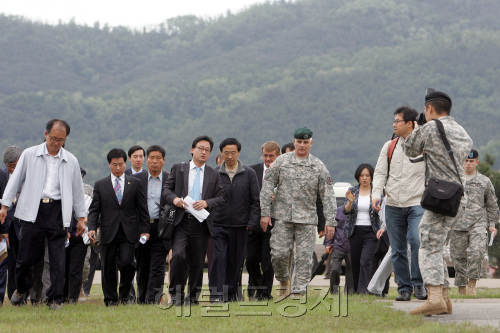Whistleblower says he felt barrels explode while tamping ground
The Korea-U.S. joint investigations into the alleged burial of deadly herbicides three decades ago at a U.S. military base in Waegwan, North Gyeongsang Province yielded some results, according to the U.S. military on Monday.
According to John Johnson, commanding general of the Eighth Army, who overseas Camp Carroll, the United States Forces Korea has been “conducting a comprehensive review” of their records. But no information has been found that directly links to the media reports, added Johnson.
A 1992 report indicated that drums containing herbicides and other chemicals, not specifying Agent Orange, were buried in the area identified in news reports, the lieutenant general said in a statement.
Also included in the reports are claims that such material and 40 to 60 tons of soil were removed from the site and disposed of offsite in 1979 to 1980. U.S. officials said they are determining why the chemicals were buried, removed, and how they were disposed.
The USFK stated that in 2004 tests were conducted using ground-penetrating radar and analyzing samples from test holes in the area of the site. One out of 13 samples contained trace amounts of dioxin, but were not deemed a safety hazard.
The Korea-U.S. joint investigations into the alleged burial of deadly herbicides three decades ago at a U.S. military base in Waegwan, North Gyeongsang Province yielded some results, according to the U.S. military on Monday.
According to John Johnson, commanding general of the Eighth Army, who overseas Camp Carroll, the United States Forces Korea has been “conducting a comprehensive review” of their records. But no information has been found that directly links to the media reports, added Johnson.
A 1992 report indicated that drums containing herbicides and other chemicals, not specifying Agent Orange, were buried in the area identified in news reports, the lieutenant general said in a statement.
Also included in the reports are claims that such material and 40 to 60 tons of soil were removed from the site and disposed of offsite in 1979 to 1980. U.S. officials said they are determining why the chemicals were buried, removed, and how they were disposed.
The USFK stated that in 2004 tests were conducted using ground-penetrating radar and analyzing samples from test holes in the area of the site. One out of 13 samples contained trace amounts of dioxin, but were not deemed a safety hazard.

“I ask both Koreans and Americans to have patience while we continue this joint assessment,” said Johnson, adding that the USFK will continue to work closely with Korean officials.
“Our number one priority remains ensuring the continued health and safety of our soldiers, families, civilian workforce and Korean neighbors,” he said.
But in light of the stir, a ruling party lawmaker has called for a revision of the Status of Forces Agreement at an emergency committee held by the National Assembly on Monday.
Kim Hak-sung of the Grand National Party said that the recent incident justifies the need to reestablish the relationship with the USFK.
“We need to renegotiate the revision of the SOFA in a direction heading towards securing the health and safety of our people,” said Kim.
The Agent Orange stir has the USFK drawing heat from Green Korea United as well, demanding that the military acknowledge responsibility.
“The dumping of Agent Orange in an USFK army base is not simply an environmental incident but is a systematic environmental crime,” said a GKU official at a press conference in front of the U.S. Embassy in Seoul on Monday.
And concerns are high after Steve House, a former American soldier stationed at Caroll, said in an interview with local news that he felt barrels explode, while tamping the area with heavy machinery.
The stir comes after KPHO-TV a CBS-affiliate TV station in Phoenix, Arizona, reported that hundreds of barrels of Agent Orange had been buried here in 1978, after citing House and two other former U.S. soldiers.
House told local media that about 600 barrels, contrary to the earlier report of 250 barrels, might have been buried near the helicopter landing facility of the camp, which is a central logistical support unit for U.S. Forces Korea.
The U.S. military sprayed millions of gallons of the toxic chemical defoliants over jungles and vegetation during the Vietnam War era.
Exposure to the herbicide, especially a component called dioxin, has been known to cause birth defects, neural illnesses and leukemia among other cancers and illnesses. More than 33,000 South Koreans who participated in the Vietnam War suffered from the aftereffects of exposure to the chemical.
The U.S. military is known to have sprayed herbicides south of the Demilitarized Zone from 1968-1969 to allow easier detection of North Korean infiltrators into the South.
Some news reports here raised the possibility that the U.S. military might have hurriedly buried the defoliant here in 1978 as lawsuits related to contamination began around that time.
Some observers said that should the alleged burial of Agent Orange be confirmed, the U.S. military might shoulder the cost to address contamination issues. But they said that it would be difficult to punish those involved as there were no cases in which a U.S. soldier has been punished for environmental contamination.
In 2003, one U.S. civilian worker in the military was given a suspended six-month jail term after civic groups filed a suit against him for leaking poisonous liquid into the Han River from the Yongsan Garrison in Central Seoul.
The SOFA, signed in 1967 between Seoul and Washington, governs the legal status of the some 28,500 soldiers, staff and their families stationed here.
By Robert Lee (robert@heraldcorp.com)











![[Today’s K-pop] BTS pop-up event to come to Seoul](http://res.heraldm.com/phpwas/restmb_idxmake.php?idx=644&simg=/content/image/2024/04/17/20240417050734_0.jpg&u=)




![[KH Explains] Hyundai's full hybrid edge to pay off amid slow transition to pure EVs](http://res.heraldm.com/phpwas/restmb_idxmake.php?idx=652&simg=/content/image/2024/04/18/20240418050645_0.jpg&u=20240418181020)

![[Today’s K-pop] Zico drops snippet of collaboration with Jennie](http://res.heraldm.com/phpwas/restmb_idxmake.php?idx=642&simg=/content/image/2024/04/18/20240418050702_0.jpg&u=)